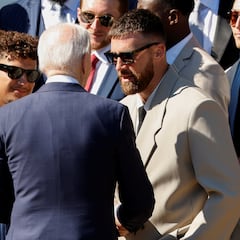NFL’s Sunday Ticket antitrust trial: What happens if the NFL loses?
With jury selection begun in Los Angeles, the massive anti-trust lawsuit facing the NFL could bring the league’s business model to its knees.


The NFL’s Sunday Ticket antitrust trial carries significant implications for both the league and the broader sports broadcasting landscape. If the NFL loses the trial, it would mark a considerable shift in how NFL games are distributed and consumed by fans.
Currently, Sunday Ticket, which is exclusive to DirecTV, offers out-of-market NFL games to subscribers, creating a lucrative revenue stream for the NFL and DirecTV. The class action lawsuit argues however that “the NFL has used agreements with broadcast partners to keep a stranglehold over distribution, allowing DirecTV to charge artificially higher prices as the sole Sunday Ticket distributor for out-of-market games.”
The league denies this allegation and maintains that there is no case to answer, but a loss in court could dismantle this exclusivity, potentially leading to, yes a more competitive, but also much more fragmented market, with multiple broadcasters bidding for the rights to individual games or packages. This is a good thing, say the fans, and would result in democratizing access to NFL content.
This 21 Billion dollar NFL SUNDAY TICKET ANTITRUST CLASS ACTION lawsuit could break the NFL. Any kind of settlement deal would likely lead to compensation for the fans. In a nutshell, is a direct challenge to the league's lucrative media rights deals. It’s heading for trial.
— Troy (Moose) Bengals & Things 🐅 (@moose196850) June 5, 2024
Should the NFL be found in violation of antitrust laws, the immediate consequence would likely be the termination of its exclusive agreement with DirecTV, at a cost of an estimated $7 to $21 billion up front. In the longer term, this would open the door for other streaming services and broadcasters to negotiate rights to show out-of-market games. For consumers, this could mean a wider range of options to watch their favorite teams, potentially at lower prices due to increased competition. Companies like Amazon, ESPN+, and YouTube could enter the fray, leveraging their existing platforms to offer NFL content, which could also lead to innovations in how games are presented and consumed.
Financially, an adverse ruling could impact the NFL’s revenue model. The league currently benefits from hefty contracts with DirecTV, and the uncertainty following a breakup of this exclusivity could affect the league’s negotiations for future broadcasting deals. Although increased competition might drive up the total value of broadcasting rights, it could also introduce variability and risk. Teams, which receive significant portions of their revenue from these broadcast deals, might face financial instability in the short term as new agreements are negotiated and implemented.
DEVELOPING: Over 2.4 million football fans who subscribe to NFL Sunday Ticket could be eligible to receive over $6 billion in damages (~$2500 each).
— Tyler Webb (@tylermwebb) May 29, 2024
This is part of an antitrust case brought against the #NFL and DirecTV back in 2015.
Let's break it down 👇
🧵1/8 pic.twitter.com/g5XTXgRkvm
Related stories
Most worryingly for the NFL is that a loss could set a legal precedent affecting other professional sports leagues with similar exclusive broadcasting agreements. Major League Baseball, the NBA, and the NHL all have their versions of out-of-market viewing packages. A ruling against the NFL could spur similar antitrust challenges against these leagues, potentially leading to a broad overhaul of sports broadcasting rights in the United States. This could result in a more fragmented market with more viewing options, but it might also create challenges in terms of maintaining consistent quality and accessibility across different platforms.
Cable and satellite providers rely on exclusive sports packages to attract and retain subscribers, and they could face significant disruption. As streaming services continue to grow in popularity, a shift away from traditional exclusive agreements could accelerate the decline of cable TV. This could also encourage broadcasters to develop more innovative and flexible subscription models to retain viewership.


Complete your personal details to comment